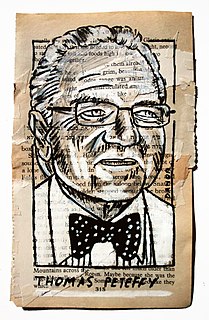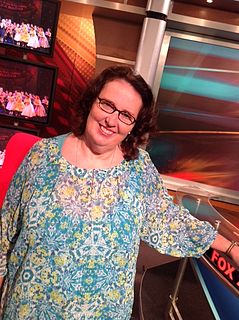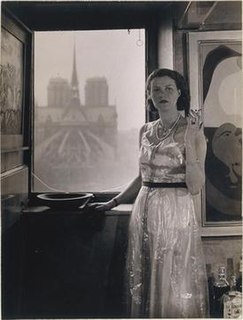A Quote by Thomas Peterffy
My mother had various jobs, from where she was regularly fired as politically undesirable. I often saw her crying and mumbling that we'll starve to death.
Related Quotes
You had every right to be. He raised his eyes to look at her and she was suddenly and strangely reminded of being four years old at the beach, crying when the wind came up and blew away the castle she had made. Her mother had told her she could make another one if she liked, but it hadn't stopped her crying because what she had thought was permanent was not permanent after all, but only made out of sand that vanished at the touch of wind and water.
But that wasn´t the first time I ever saw her. I saw her in the hallways at school, and at my mother’s false funeral, and walking the sidewalks in the Abnegation sector. I saw her, but I didn’t see her; no one saw her the way she truly was until she jumped. I suppose a fire that burns that bright is not meant to last.
One thing I did have under my belt was, my mother lost her mother when she was 11. She mourned her mother her whole life and made my grandmother seem present even though I never met her. I couldn't imagine how my mom could go on but she did, she took care of us, she worked two jobs and had four children. She was such a good example of how to conduct oneself in a time of grief. When I lost my husband, I tried to model myself as much as I could on her.
Her mother was a Christian Scientist who didn't believe in calling doctors. So when my mother caught whooping cough as a baby, stopped breathing and turned blue, her mother revived her by spanking her on the bottom. She saw life itself as a gift and saw her own survival as precious and a matter of chance.
She liked being reminded of butterflies. She remembered being six or seven and crying over the fates of the butterflies in her yard after learning that they lived for only a few days. Her mother had comforted her and told her not to be sad for the butterflies, that just because their lives were short didn't mean they were tragic. Watching them flying in the warm sun among the daisies in their garden, her mother had said to her, see, they have a beautiful life. Alice liked remembering that.
They lifted their faces to the astonishing warmth. The sky arched over them, a pale, clear blue. Lina felt as though a lid that had been on her all her life had been lifted off. Light and air rushed though her, making a song, like the songs of Ember, only it was a song of joy. She looked at Doon and saw that he was smiling and crying at the same time, and she realized that she was, too.
The problem with my mother is that she didn't go to the doctor. And I think by the time she started to show symptoms that something might not be right, and finally went to the doctor, she was so close to her death that she couldn't get the care she had needed. Her big issue was not going to the doctor.
I found her lying on her stomach, her hind legs stretched out straight, and her front feet folded back under her chest. She had laid her head on his grave. I saw the trail where she had dragged herself through the leaves. The way she lay there, I thought she was alive. I called her name. She made no movement. With the last ounce of strength in her body, she had dragged herself to the grave of Old Dan.
The idea of the book ["The Japanese Lover"] came in a conversation that I had with a friend walking in the streets of New York. We were talking about our mothers, and I was telling her how old my mother was, and she was telling me about her mother. Her mother was Jewish, and she said that she was in a retirement home and that she had had a friend for 40 years that was a Japanese gardener. This person had been very important in my friend's upbringing.



































